#british colonial period
Text
This is probably my last post on the whole “Liz is dead” situation but I want to talk about my great grandmother, who is currently 92 years old. When I was growing up, hell even now, she’d tell me a lot about her own stories, mostly about how terrifying life was under both the British Raj and Nizam rule (her side of my family is from Hyderabad - Google the Nizams and the Razakars if you’ve never heard about them, that’s a whole other thing of its own).
Something I remember very clearly is her telling me about this one song she was forced to sing in her school - she went to a Christian convent school - and the song was about the greatness of “George Prabhu and Mary Rani,” aka George V, Elizabeth II’s grandfather. Recently my mom was able to film her singing this song so that we could listen to the lyrics, which are originally in Telugu, and roughly translated it means “we’re singing in honor of George and Mary, who are the rulers of India and have brought great fortune to India, and we see them as our father and mother.”
This is just a really difficult reminder that when we’re talking about why Elizabeth II and the royal family don’t deserve our respect or condolences, many of us have very personal stories that run deep through our families. “But she was a mother, a grandmother, a person” and I don’t care because she and her family were in the business of dehumanizing and erasing the identities of millions of other mothers, other grandmothers, other PEOPLE. Why else would my great grandmother be forced to sing a song in their honor? “But she wasn’t responsible for India” fair enough, her darling grandfather had a great time doing that, but how about you go and talk to Kenya? Or anyone in Africa? Or the Caribbean? I’m sick and tired of being told to “not speak ill of the dead” when REALLY I and millions of others should be getting an apology from anyone who wants to “praise her legacy” and talk about how “revolutionary” she was.
edit: i got the george’s mixed up before. george v is elizabeth ii’s grandfather. george vi is her father.
#that being said#my thoughts are also w the middle and working classes of the uk who will now unfortunately have to bear the brunt of the aftermath of this#of course they’d force a ‘period of mourning’ on everyone 🙃#anyway#ding dong the bitch is dead#queen elizabeth#elizabeth ii#george v#anti british#british royal family#british raj#british colonialism#fuck the british#fuck colonialism#desiblr#desi tumblr#desi tag#indian#india#indian independence movement#hyderabad#telangana#telugu#south india
9K notes
·
View notes
Text
Socmed discussions about Saltburn, to me —
1) reveal that people are even more squeamish about explicit gay sexuality than they think they are
(And if this is what passes for shocking erotic excess, then we, in the anglosphere, are in a more — not making a comment about individuals here — restrained moment with mainstream American/British adult cinema than we were with mainstream adult heterosexual cinema in the 90s, eg the erotic thriller)
And
2) suggest people are increasingly making art that is in conversation with, if not explicitly nostalgic for, the 2010-16 Tumblr-era.
(I really truly suspect Saltburn is, in part, an adaptation of the tropes and aesthetics that were in certain “The Social Network” fan spaces.)
#Saltburn is a period piece of this very specific very Anglophile tumblr moment#that specifically was obsessed with poshness and the upper class (usually more or less aristocratic) of the UK#much of the tumblr cultural backlash to that moment (eg the British accent jokes now; the food jokes)#is just USAmericans getting embarrassed over having prostrated themselves at the uncaring altar of British old money#and in response to that embarrassment these USAmericans I guess just started shitting on poor British class signifiers (eg usually a lot of#the mockery is about northerners esp northern women)#which is really just a continuation of tasteless American passes at being ‘above’ the poor brits they’re mocking to align with the landed#and titled of the UK#which lol they hate you just like they hate the poor British!! silly silly silly attempt to appear worldly#and to be clear my comments are about a specific kind of American-Brit beef between white tumblr users#and none of the conversation is meaningfully about British colonialism or American cultural or literal imperialism#or even about anglocenticism in general#j realize this a lot to write about something that can be boiled down to : specious and inane comments r being made by the stupidest of the#site from the imperial core of the world#and it’s usually between users who have no fucking business making class jokes#because critically the experiences they’re mocking are so removed from any struggle for survival they’ve had — on both the USA and UK side
13 notes
·
View notes
Text
what’s so different about the victorian era and today’s world? humans are still destroying the planet, corporations are still enforcing unsafe work environments, racists still arguing that “not all slave owners were bad,” the british royal family is still problematic af, reproductive rights are still determined by rich, white men and folks still fuck with that dark academia aesthetic
#padawan historian#late night musings#orbiting in my mind#settler-colonialism#period drama#the british royal family#dark acamedia
19 notes
·
View notes
Text
did you guys know that the mother fucking UN's humanitarian and legal experts have been saying israel's occupation of palestine territories is and has always been illegal, as it violates the FUCKING GENEVA CONVENTION? did you know it was britain that 'gave' the land that wasn't theirs to give to found the state of israel as a tactic to get more jews to join the british army in their already-active war against the ottoman empire? did you know that just between 2008 and 2022 the idf killed almost SEVEN THOUSAND palestinians, as opposed to the 308 israelis by palestinians in the same time period? did you know that israel itself admits to 'forcefully evacuating' palestinians from their homes over the course of their annexation of the country? did you know the british army helped them? did you know that any palestinian who didn't want to have their house taken from them and given to american immigrants being shipped in to populate britain's pet project was killed on their spot? did you know that back in 2018 palestinians did nothing but MARCH in protest of their occupation and in response, the idf is CONFIRMED to have killed almost 400 of them, including FIFTY FIVE CHILDREN? did you know palestinians are not allowed to build anything on the land they have left? did you know they aren't ALLOWED TO LEAVE?? did you know over HALF of christian evangelicals support israel solely because the bible says israel has to exist in order to bring about the second coming? did you know that in 2021, over 88% of us congress were evangelical christians? did you know israel is confirmed to have knowingly bombed palestinian hospitals and the idf had been caught targeting journalists? did you know israel is committing another war crime at this very moment by dropping white phosphorus on gaza civilians? did you know the israeli press was just confirmed to have completely fabricated an account of palestinian war crime right after their own got caught on film? did you know the defense minister of israel openly called all palestinians 'animals' to justify the deaths of their civilians? did you know holocaust survivors are presently speaking out against the israeli state's ethnic cleansing of arabs?
why, in the united states, is criticizing a settler colony's active attempts at extermination labeled antisemitic because of the religion the settlers happen to practice, but rooting for the complete eradication of a muslim country that was already there and is barely still there not islamophobia?? why is religion being used as a shield to justify genocide?
when a sudden act of politically charged violence occurs, like the hamas attack a few days ago, i ask WHY? i ask WHY until i get as far back as i can. i read accounts written by all sides. i try to find out why this is happening in the first place. half of these facts have come from the israeli government itself. all of them are easily found and easily confirmed by reputable sources. a lot of them are caught on film. all of these facts lead me to know that the state of israel was created by britain in order to gain an advantage in an unrelated war. i know the state of israel has caused unimaginable harm to the country it's slowly eating, and has suffered just a fraction in return. i know religion justifies none of it.
palestinians deserve to live in their own country. palestinians deserve to not be forced to give their homes to americans. palestinians deserve to live, to leave, to stay, to wave their own fucking flag. they do not deserve to have another country plopped on top of them and then have their settlers ask 'don't WE have a right to exist?' as their own right to exist is being extinguished.
fuck the idf, fuck israel, fuck manifest destiny, fuck all settlers who think they deserve someone else's home enough to kick them out of it. literally, in israel's case. indigenous americans, indigenous canadians, chicanos, pacific islanders, filipinos, mestizos, we should all be standing with palestine, because we KNOW how colonial violence goes and what it looks like. solidarity between all colonised peoples. free palestine.
8K notes
·
View notes
Text
An Introduction to Highland Swordsmanship
During the 18th Century, the Highland Scot came into vogue in Great Britain. After years of repression and persecution of the Scottish Gael, it was ironically the Highland Regiments of the British Army that preserved many of the proud Gaelic martial...
Background
I’ve been teaching at the high school level online since 2015 (you know, before COVID made it vogue to do so). But I’d had a taste of it as a student since 2010 with the Cateran Society, where I began learning Highland Broadsword. It involved reading primary and secondary sources on Highland Broadsword fencing, videoing myself and fencing partners performing these, sending them to…
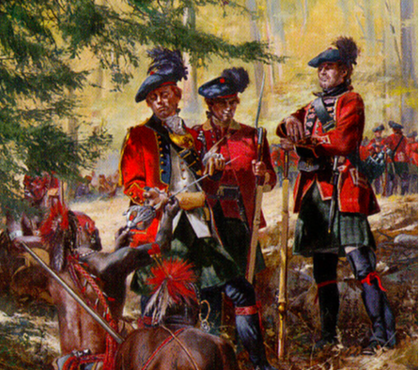
View On WordPress
#british empire#broadsword#broadsword academy#caledonian#cateran society#claymore#colonial history#colonial period#cudgeling#education#fencing#hema#henry angelo#highlander#historical european martial arts#historical fencing#history#olympic fencing#online education#scotland#scottish#scottish history#single stick#singlestick#swords
0 notes
Text

Regency AU with Price (as always the gif does not represent the reader, only the vibe)
Tags: first meetings, social faux pas, love at first sight, British imperialism mention, classism, a little period typical misogyny, Price keep your hands to yourself please
You've never deluded yourself into thinking you're marriage material, never concerned yourself with your lack of marriage prospects. The child of a doctor with no title to his name, and a midwife with even less. You're in good standing, but you know well enough that among the delicate fingers of the noble ladies, you're a sore thumb.
A captain is certainly out of reach for someone like you. You don't mind, of course, you're perfectly content to remain single and eventually take over your father's practice. Still, you do look up with the rest of the crowd when the announcement is made. Captain John Price. He's young. Too young to have made such a commission, but his eyes are old and the stern set of his brow, the tight lipped smile, speak to a man who has seen more in his short life than most men will by 80. His eyes meet yours and you look away, snap your fan open to distract yourself from the boiling heat of the greenhouse the party is being held in. That must be what makes your skin prickle.
You bemoan the fact that your friends have lost all interest in conversation in favor of tittering over the new arrival.
"Fresh from the colonies, I hear," one of your friends whispers, "he hasn't been home in a good few years."
"I heard he's going to be made a baron," your other friend whispers back.
"I hear he's rot his dick clean off from scurvy," you grumble.
"Did you now?" A voice rumbles with amusement behind you. You squeeze your eyes shut for a brief second and curse yourself before plastering on a smile and turning to face the man of the hour. You flutter your fan in front of your face and hope it looks more demure than your mouth would suggest.
He's better looking up close. His eyes sparkle, and his smile seems less forced, more open. It's the hint of teeth that break up his lips, different from the tightness he'd given upon announcement. You curtsey, as is proper when meet a man above your station, which is just about every man here. Money can buy you an invitation but not the good will other women may have.
"Captain," you have no follow up for that, so you attempt to mean it as a greeting, "I meant no harm."
His fingers tighten around yours when you try to pull them away, but he does straighten up, apparently unbothered by the surrounding crowd's murmurs. He must have hit his head and been sent home due to madness. You're sure that's the only explanation for the heat in his eyes and the smirk on his lips. A man who's lived a life of violence and still holds himself so tall shouldn't bow his head to you.
"Of course not," he holds his hand out, and like a fool you place your fingers against his. He doesn't raise your hand to his lips like so many other men, he bows to it. Bows to meet your knuckles with his lips. Bows with his arm tight behind his back and his eyes lowered. As if you were the queen, and not some doctor's daughter. Your face bursts with heat and you glance around to be sure there aren't any eyes on you.
"Please don't do that," you tell him quietly, whispering it furtively to try and stem the murmurs. His grip on your hand shifts, drops your fingers to hold your wrist.
"Perhaps you'd prefer something else?" He pulls your arm up, turns your hand over to press his lips against the thrumming pulse in your wrist, his gaze holds yours all the while. Your stomach flips pleasantly. The tips of your fingers brush against his dark hair, and you imagine you can feel it through your gloves. "A dance? Or an apology?" He kisses further past your wrist, pulling you closer, "Or perhaps I should be asking for one from you." Another kiss, just below the bend of your elbow.
Was there a crowd? You can't imagine there's anything but you and the captain? No one in the world but the two of you standing in front of each other as his lips skate the top edge of your glove. The feeling of his skin against yours is like touching the inside of an oven, a short shock that makes you want to pull away, a heat that lingers long after the touch is gone. Have you ever wanted to put your hand in a fire so badly?
"Would you like me to apologize?" You ask him, pushing your voice out even past the breathless bubble in your chest. He closes his eyes, tips his head to run his nose against your skin with a sigh.
"Never."
It's so simple a word and yet it drops like a heavy weight into your stomach. It roots you, binds you, when his hand touches the small of your back to pull you closer you go without a second thought. Spellbound.
"God," he breathes, "I'd have come home sooner if I knew you were waitin' for me."
"You don't even know me," You smile, feeling like you've been let in on a joke only the two of you know.
"Oh sweetheart," something in his voice is cloying sweet, something in his eyes -so stormy blue you'd think he bottled the ocean tides just to see through their colored glass- that speaks to a promise you never hoped for, "I've got a lifetime to learn."
#cod x reader#x reader#x oc#cod x oc#captain john price#john price x reader#john price mw2#john price#captain price cod#captain price mw2#captain price#captain price x reader#captain price x oc#oc: duck#oc: witch#take your pick on who it is#x f!reader#price x reader#price x oc#regency au#gnawing at the bars of my enclosure
2K notes
·
View notes
Photo

A farewell to the last Palestinian crocodile
The Palestinian crocodile went extinct during the British Mandate period of Palestine, it’s last traceable rhetorical circulation to 1935. Here, the crocodile represents the ecological damage of colonialism in Palestine’s indigenous wildlife, which extends to modern day occupied Palestine. [further reading].
#Palestine#original art#crocodile#traditional clothing#thobe#artists on tumblr#digital art#colonialism#settler colonialism#my art#free palestine
12K notes
·
View notes
Text

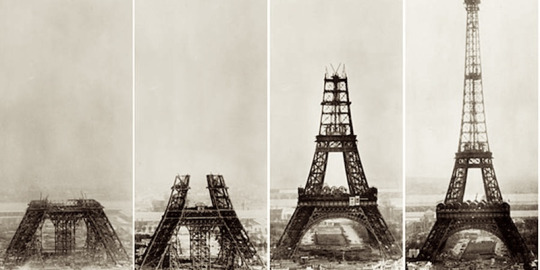
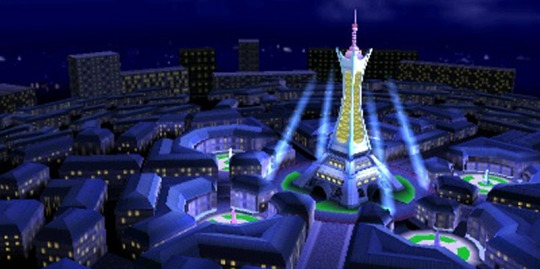
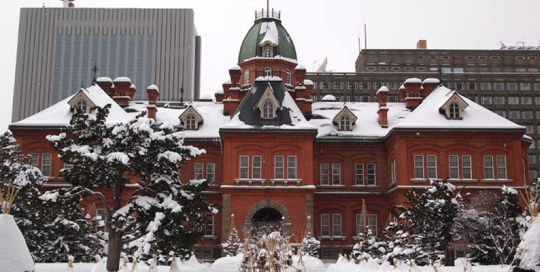

So, with the new legends there's a neat way we can take a guess at some of the time frame. Although it's largely aesthetic and hard to gauge the intended historical parallels of, the not-Eiffel Tower at the center of the city could presumably have been completed in the late 1880s like the real thing. Interestingly that places it pretty concurrent to the construction of the Hokkaido Government building in the 1870s that served as the basis of the Galaxy Team HQ in the first Legends game.
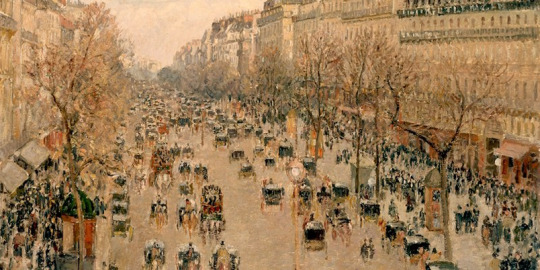
But with the keywords being "urban redevelopment" the setting could only possibly be Haussman's renovation of Paris that took place from the 1850s-1920s. So given that the tower is already standing, that places Legends Z-A between 1889 and 1927.
And I doubt it would play into the setting of a Pokemon game but I think it's neat that it would mean taking place firmly in the 3rd French Republic, as that's not typically the most romanticized period of French history. (Kind of shocking given just how much Japanese pop culture loves to fixate on the Ancien Regime and Rococco architecture.) It's right at the height of the French Colonial empire and their rivalry with the British... Even if they don't address the history directly, certainly not the darker bits, I wonder if we'll see an ancestor of Rose* and some mention of Kalos and Galar's relation as a hint at the Pokemon world's equivalent of India. (Elephant, what elephant...)
*put a pin in that... Well come back to Rose later...

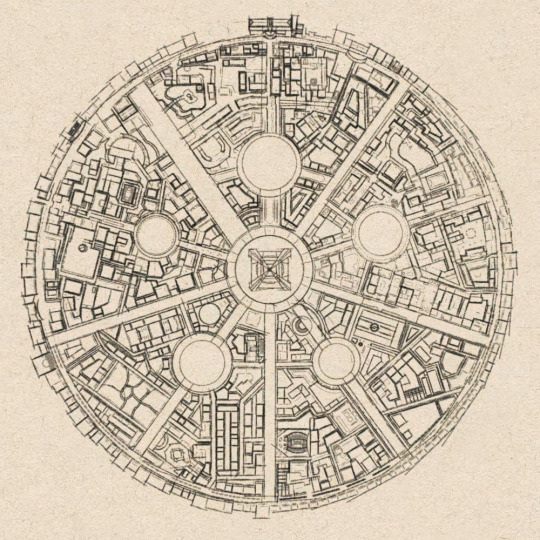
Also I know a lot of the stupid "leaks" that were just running with any/every rumor they could find had been talking about Celebi, despite there being no signs of it in the direct, but it's possible that the Z-A title and the fadethru of the sort of sci-fi looking city diagram into a pencil and parchment one is indicating going back in time --backwards, from Z to A, end to start.
and just so long as I'm just picking at edges of things...

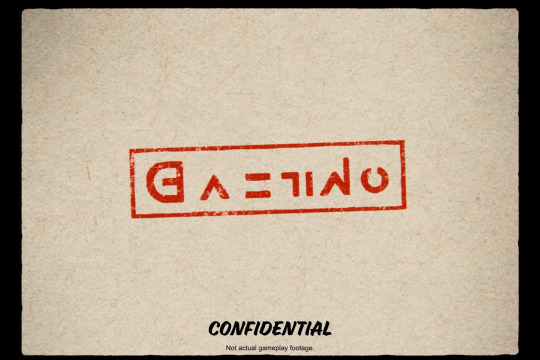
The unknown are an anagram of, "POKEMON PRESENTS"(oh and the SOEYUE one at the end is just "SEE YOU") and the ""confidential"" stamp on the documents likely reads "Gokuhi" as in gokuhi[極秘]: "Top Secret," but the rest of the text doesn't seem to match either Japanese, French, or English,
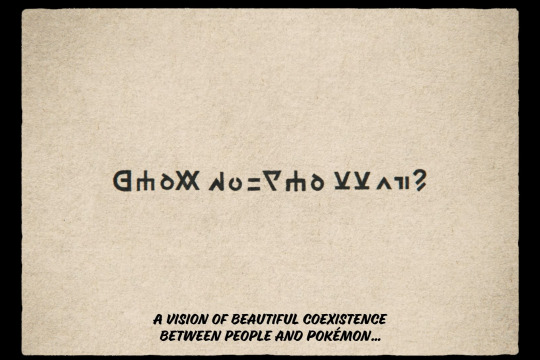
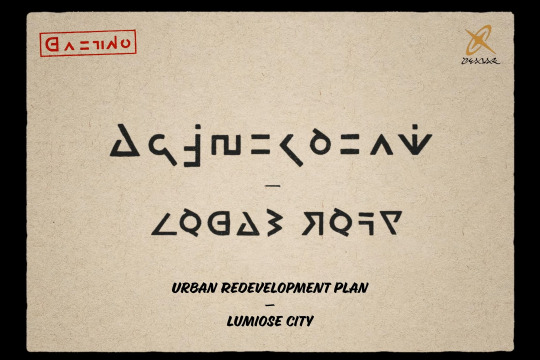


Hito to POKEMON no kyouzon o yumemite[人と ポケモンの共存を夢見て]: "Dreaming of people and Pokemon's coexistence"
Toshisaikaibatsu hassou MIARE CITY[都市再開発発想ミアレシティ]: "Urban Redevelopment Concept Miare City"
The obvious exception being that redacted text is clearly the romanized MIARE from the Japanese MIARE[ミアレ] and the English CITY, which is the Japanese name for what was localized as "Lumiose."
Curiously the word "Pokemon" is very clearly missing from the passage, and also in both cases there are too few "Galarian" characters for how long the phrases are in any actual language.

and finally, given some of the existing examples of handwritten Galarian in SwSh, I'm guessing the text on the big logo is as i've transcribed into the more standard Galar font, although I'm really uncertain about that second one, and a bit iffy about the big "X"s, but the little cyclone O, the V with the underbar, and the E seem certain enough.
Also there's a logo I know I remember seeing that looks like this one but I can't remember where it is or what it's associated with.... It's the logo on the Macro Cosmos power plant. Not Rose's personal logo with the stylized rose, and not the Cosmos business logo with the big star system orbital ring Cs, but the power plant in Hammerlock where you go to fight Eternatus specifically.
It would be really neat if whatever this organization is was tied back to an ancestor of Rose and Peony and the origins of Macro Cosmos somehow.


616 notes
·
View notes
Note
This is maybe a stupid question but do you think there's any ties between like orientalist trends in western countries that glorify dharmic religions and Hindutva? Like I've heard 'Hinduism is the oldest religion on Earth' and 'Hinduism/Buddhism are just so much more enlightened than savage Abrahamic religions' and 'how could there be war and oppression in India? Hindus don't believe in violence' from white liberals and it certainly seems *convenient* for Hindutva propaganda, at least.
Not stupid at all! Historically, orientalism precedes modern Hindutva. The notion of a unified Hinduism is actually constructed in the echo of oriental constructions of India, with Savarkar clearly modelling One Nation, One Race, One Language on westphalian nationhood. He will often draw on Max Mueller type of indology orientalists in his writing in constructing the Hindu claim to a golden past and thus an ethnostate.
In terms of modern connections you can see the use and abuse of orientalism in South Asian postcolonial studies depts in the west that end up peddling Hindutva ideology –
The geographer Sanjoy Chakravorty recently promised that, in his new book, he would “show how the social categories of religion and caste as they are perceived in modern-day India were developed during the British colonial rule…” The air of originality amused me. This notion has been in vogue in South Asian postcolonial studies for at least two decades. The highest expression of the genre, Nicholas Dirks’s Castes of Mind, was published in 2001. I take no issue with claiming originality for warmed-over ideas: following the neoliberal mantra of “publish or perish,” we academics do it all the time. But reading Chakravorty’s essay, I was shocked at the longevity of this particular idea, that caste as we know it is an artefact of British colonialism. For any historian of pre-colonial India, the idea is absurd. Therefore, its persistence has less to do with empirical merit, than with the peculiar dynamics of the global South Asian academy.
[...] No wonder that Hindutvadis in both countries are now quoting their works to claim that caste was never a Hindu phenomenon. As Dalits are lynched across India and upper-caste South Asian-Americans lobby to erase the history of their lower-caste compatriots from US textbooks, to traffic in this self-serving theory is unconscionable.
You can see writer sociologists beloved of western academia like Ashish Nandy argue for the "inherent difference of indian civilization makes secularism impossible" and posit that the caste ridden gandhian hinduism is the answer as though the congress wasn't full of hindutva-lites and that the capture of dalit radicalism by electoralism and grift is actually a form of redistribution. Sorry if thats not necessarily relevant I like to hate on him.
Then most importantly is the deployment of "Islamic Colonization" that Hindu India must be rescued from, which is merely cover for the rebrahmanization of the country. This periodization and perspective of Indian history is obviously riven up in British colonial orientalism, see Romila Thapar's work on precolonial India. Good piece on what the former means if you've not engaged with it, fundamentally it posits an eternal Hindu innocence.
#sorry for not posting new articles tbh but these have received airtime before on this blog bc theyre good!#asks#hindutva
496 notes
·
View notes
Text
My alternate universe fantasy colonial Hong Kong is more authoritarian and just as racist but less homophobic than in real life, should I change that?
@floatyhands asked:
I’m a Hongkonger working on a magical alternate universe dystopia set in what is basically British colonial Hong Kong in the late 1920s. My main character is a young upper middle-class Eurasian bisexual man.
I plan to keep the colony’s historical racial hierarchy in this universe, but I also want the fantasy quirks to mean that unlike in real life history, homosexuality was either recently decriminalized, or that the laws are barely enforced, because my boy deserves a break. Still, the institutions are quite homophobic, and this relative tolerance might not last. Meanwhile, due to other divergences (e.g. eldritch horrors, also the government’s even worse mishandling of the 1922 Seamen's Strike and the 1925 Canton-Hong Kong Strike), the colonial administration is a lot more authoritarian than it was in real history. This growing authoritarianism is not exclusive to the colony, and is part of a larger global trend in this universe.
I realize these worldbuilding decisions above may whitewash colonialism, or come off as choosing to ignore one colonial oppression in favor of exaggerating another. Is there any advice as to how I can address this issue? (Maybe I could have my character get away by bribing the cops, though institutional corruption is more associated with the 1960s?) Thank you!
Historical Precedent for Imperialistic Gay Rights
There is a recently-published book about this topic that might actually interest you: Racism And The Making of Gay Rights by Laurie Marhoefer (note: I have yet to read it, it’s on my list). It essentially describes how the modern gay rights movement was built from colonialism and imperialism.
The book covers Magnus Hirschfeld, a German sexologist in the early 1900s, and (one of) his lover(s), Li Shiu Tong, who he met in British Shanghai. Magnus is generally considered to have laid the groundwork for a lot of gay rights, and his research via the Institut für Sexualwissenschaft was a target of Nazi book-burnings, but he was working with imperial governments in an era where the British Empire was still everywhere.
Considering they both ended up speaking to multiple world leaders about natural human sexual variation both in terms of intersex issues and sexual attraction, your time period really isn’t that far off for people beginning to be slightly more open-minded—while also being deeply imperialist in other ways.
The thing about this particular time period is homosexuality as we know it was recently coming into play, starting with the trial of Oscar Wilde and the rise of Nazism. But between those two is a pretty wildly fluctuating gap of attitudes.
Oscar Wilde’s trial is generally considered the period where gay people, specifically men who loved men, started becoming a group to be disliked for disrupting social order. It was very public, very scandalous, and his fall from grace is one of the things that drove so many gay and/or queer men underground. It also helped produce some of the extremely queercoded classical literature of the Victorian and Edwardian eras (ex: Dracula), because so many writers were exploring what it meant to be seen as such negative forces. A lot of people hated Oscar Wilde for bringing the concept to such a public discussion point, when being discreet had been so important.
But come the 1920s, people were beginning to wonder if being gay was that bad, and Mangus Hirschfeld managed to do a world tour of speaking come the 1930s, before all of that was derailed by wwii. He (and/or Li Shiu Tong) were writing papers that were getting published and sent to various health departments about how being gay wasn’t an illness, and more just an “alternative” way of loving others.
This was also the era of Boston Marriages where wealthy single women lived together as partners (I’m sure there’s an mlm-equivalent but I cannot remember or find it). People were a lot less likely to care if you kept things discreet, so there might be less day to day homophobia than one would expect. Romantic friendships were everywhere, and were considered the ideal—the amount of affection you could express to your same-sex best friend was far above what is socially tolerable now.
Kaz Rowe has a lot of videos with cited bibliographies about various queer disasters [affectionate] of the late 1800s/early 1900s, not to mention a lot of other cultural oddities of the Victorian era (and how many of those attitudes have carried into modern day) so you can start to get the proper terms to look it up for yourself.
I know there’s a certain… mistrust of specifically queer media analysts on YouTube in the current. Well. Plagiarism/fact-creation scandal (if you don’t know about the fact-creation, check out Todd in the Shadows). I recommend Kaz because they have citations on screen and in the description that aren’t whole-cloth ripped off from wikipedia’s citation list (they’ve also been published via Getty Publications, a museum press).
For audio-preferring people (hi), a video is more accessible than text, and sometimes the exposure to stuff that’s able to pull exact terms can finally get you the resources you need. If text is more accessible, just jump to the description box/transcript and have fun. Consider them and their work a starting place, not a professor.
There is always a vulnerability in learning things, because we can never outrun our own confirmation bias and we always have limited time to chase down facts and sources—we can only do our best and be open to finding facts that disprove what we researched prior.
Colonialism’s Popularity Problem
Something about colonialism that I’ve rarely discussed is how some colonial empires actually “allow” certain types of “deviance” if that deviance will temporarily serve its ends. Namely, when colonialism needs to expand its territory, either from landing in a new area or having recently messed up and needing to re-charm the population.
By that I mean: if a fascist group is struggling to maintain popularity, it will often conditionally open its doors to all walks of life in order to capture a greater market. It will also pay its spokespeople for the privilege of serving their ends, often very well. Authoritarians know the power of having the token supporter from a marginalized group on payroll: it both opens you up directly to that person’s identity, and sways the moderates towards going “well they allow [person/group] so they can’t be that bad, and I prefer them.”
Like it or not, any marginalized group can have its fascist members, sometimes even masquerading as the progressives. Being marginalized does not automatically equate to not wanting fascism, because people tend to want fascist leaders they agree with instead of democracy and coalition building. People can also think that certain people are exaggerating the horrors of colonialism, because it doesn’t happen to good people, and look, they accept their friends who are good people, so they’re fine.
A dominant fascist group can absolutely use this to their advantage in order to gain more foot soldiers, which then increases their raw numbers, which puts them in enough power they can stop caring about opening their ranks, and only then do they turn on their “deviant” members. By the time they turn, it’s usually too late, and there’s often a lot of feelings of betrayal because the spokesperson (and those who liked them) thought they were accepted, instead of just used.
You said it yourself that this colonial government is even stricter than the historical equivalent—which could mean it needs some sort of leverage to maintain its popularity. “Allowing” gay people to be some variation of themselves would be an ideal solution to this, but it would come with a bunch of conditions. What those conditions are I couldn’t tell you—that’s for your own imagination, based off what this group’s ideal is, but some suggestions are “follow the traditional dating/friendship norms”, “have their own gender identity slightly to the left of the cis ideal”, and/or “pretend to never actually be dating but everyone knows and pretends to not care so long as they don’t out themselves”—that would signal to the reader that this is deeply conditional and about to all come apart.
It would, however, mean your poor boy is less likely to get a break, because he would be policed to be the “acceptable kind of gay” that the colonial government is currently tolerating (not unlike the way the States claims to support white cis same-sex couples in the suburbs but not bipoc queer-trans people in polycules). It also provides a more salient angle for this colonial government to come crashing down, if that’s the way this narrative goes.
Colonial governments are often looking for scapegoats; if gay people aren’t the current one, then they’d be offered a lot more freedom just to improve the public image of those in power. You have the opportunity to have the strikers be the current scapegoats, which would take the heat off many other groups—including those hit by homophobia.
In Conclusion
Personally, I’d take a more “gays for Trump” attitude about the colonialism and their apparent “lack” of homophobia—they’re just trying to regain popularity after mishandling a major scandal, and the gay people will be on the outs soon enough.
You could also take the more nuanced approach and see how imperialism shaped modern gay rights and just fast-track that in your time period, to give it the right flavour of imperialism. A lot of BIPOC lgbtqa+ people will tell you the modern gay rights movement is assimilationalist, colonialist, and other flavours of ick, so that angle is viable.
You can also make something that looks more accepting to the modern eye by leaning heavily on romantic friendships that encouraged people waxing poetic for their “best friends”, keeping the “lovers” part deeply on the down low, but is still restrictive and people just don’t talk about it in public unless it’s in euphemisms or among other same-sex-attracted people because there’s nothing wrong with loving your best friend, you just can’t go off and claim you’re a couple like a heterosexual couple is.
Either way, you’re not sanitizing colonialism inherently by having there be less modern-recognized homophobia in this deeply authoritarian setting. You just need to add some guard rails on it so that, sure, your character might be fine if he behaves, but there are still “deviants” that the government will not accept.
Because that’s, in the end, one of the core tenants that makes a government colonial: its acceptance of groups is frequently based on how closely you follow the rules and police others for not following them, and anyone who isn’t their ideal person will be on the outs eventually. But that doesn’t mean they can’t have a facade of pretending those rules are totally going to include people who are to the left of those ideals, if those people fit in every other ideal, or you’re safe only if you keep it quiet.
~ Leigh
#colonialism#colonization#worldbuilding#alternate history#history#lgbt#china#hong kong#british empire#ask
529 notes
·
View notes
Text
I understand why, despite clearly being central predominantly in the 'eastern' half of the country, this region is referred to as The Midwest (originally, the term West was applied in the British colonial period and by the 1800s, it meant anything west of Appalachia, or later, west of the Mississippi River.)
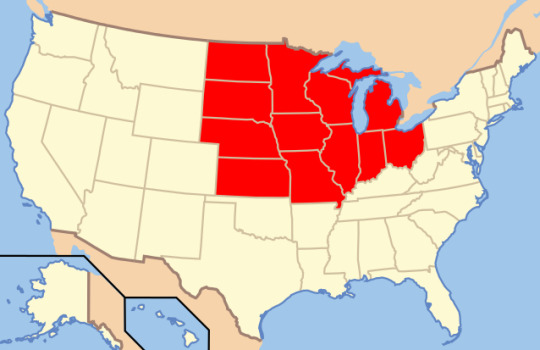
But given that distinction has not really been relevant for a long time, I propose that this area now be referred to as 'the Middle East'.
Thank you for your consideration.
758 notes
·
View notes
Text
Sean makes me so sad, especially because he's really characterized by fans as being just silly and stupid, but if you just watch him for a bit you get so much more. The way he's treated by the gang really makes me think that they are not as much of a family as some believe. The gang is just as influenced by the time period as anyone else. The men are given noticably less care, they're expected to act a certain way and there is noticable pushback when they do not. Arthur and Sean are both kidnapped and tortured and the pain they experienced is never mentioned again. Sean is put right back to work and chastised when he tries to get a moments rest.
I think him and Karen as a couple are super underrated too, they've both cornered themselves into a stereotype/niche in the gang, and really can't find a way out of that. Karen is tough, Sean is supposed to be happy to lucky. They both have issues with drinking and neither receive much emotional support by the people around them.
Sean has been through so much. Note that he grew up barely forty years after the famine that killed millions of Irish people. He grew up poor, under the brutal systems of British colonialism. His father fought against that and when he tried to flee, he was murdered in his own bed (likely with his son either in the same room or adjacent room). I think we need more collective appreciation for the funky little guy, he's a lot more than a silly younger sibling figure.
151 notes
·
View notes
Quote
Then comes the problem of ensuring that the settler state and society replacing that of the indigenous Arabs is “Jewish.” Even in the pre-state period when the Yishuv was wrestling with the British authorities over immigration, the Jewish Agency and other Zionist institutions vetted the immigrants by their Jewishness. With the establishment of Israel, the Law of Return applied solely to Jews. Now Israel had another problem: How to present itself as a liberal European democracy while preventing the return to their homes of 720,000 Palestinian refugees from the 1948 Nakba? Population management in the form of technical legalisms provided a solution. The Citizenship Law of 1952 permitted everyone who had Palestinian nationality to return, but with a caveat: they had to have been registered residents of Israel in 1949. With that sleight of legal hand all the refugees were “legally” barred from returning to their homeland. Those that remained – 150,000 out of more than a million – were subject to some 184 laws that limited their civil rights. Some were symbolic, like the Jewish Nationality Law of 2019 that demotes Arabic from an official language to one of “special status.” Others more disenfranchising. Palestinian citizens of Israel, for example, are forbidden to buy, rent, lease or reside on land or buildings on land that are defined as “Jewish” – lands on 94 percent of their own country.
Jeff Halper, Decolonizing Israel, Liberating Palestine: Zionism, Settler Colonialism, and the Case for One Democratic State
882 notes
·
View notes
Text
when the British Empire's researchers realized that the cause of the ecological devastation was the British Empire:

much to consider.
on the motives and origins of some forms of "environmentalism".
---
Since the material resources of colonies were vital to the metropolitan centers of empire, some of the earliest conservation practices were established outside of Europe [but established for the purpose of protecting the natural resources desired by metropolitan Europe]. [...] [T]ropical island colonies were crucial laboratories of empire, as garden incubators for the transplantation of peoples [slaves, laborers] and plants [cash crops] and for generating the European revival of Edenic discourse. Eighteenth-century environmentalism derived from colonial island contexts in which limited space and an ideological model of utopia contributed to new models of conservation [...]. [T]ropical island colonies were at the vanguard of establishing forest reserves and environmental legislation [...]. These forest reserves, like those established in New England and South Africa, did not necessarily represent "an atavistic interest in preserving the 'natural' [...]" but rather a "more manipulative and power-conscious interest in constructing a new landscape by planting trees [in monoculture or otherwise modified plantations] [...]" [...].
Text by: Elizabeth DeLoughrey and George B. Handley. "Introduction: Toward an Aesthetics of the Earth". Postcolonial Ecologies: Literatures of the Environment, edited by DeLoughrey and Handley. 2011.
---
It is no accident that the earliest writers to comment specifically on rapid environmental change in the context of empires were scientists who were themselves often actors in the process of colonially stimulated environmental change. [...] As early as the mid-17th century [...] natural philosophers [...] in Bermuda, [...] in Barbados and [...] on St Helena [all British colonies] were all already well aware of characteristically high rates of soil erosion and deforestation in the colonial tropics [...]. On St Helena and Bermuda this early conservationism led, by 1715, to the gazetting of the first colonial forest reserves and forest protection laws. On French colonial Mauritius [...], Poivre and Philibert Commerson framed pioneering forest conservation [...] in the 1760s. In India William Roxburgh, Edward Balfour [...] ([...] Scottish medical scientists) wrote alarmist narratives relating deforestation to the danger of climate change. [...] East India Company scientists were also well aware of French experience in trying to prevent deforestation [...] [in] Mauritius. [...] Roxburgh [...] went on to further observe the incidence of global drought events which we know today were globally tele-connected El Nino events. [...] The writings of Edward Balfour and Hugh Cleghorn in the late 1840s in particular illustrate the extent of the permeation of a global environmental consciousness [...]. [T]he 1860s [were] a period which we could appropriately name the "first environmental decade", and which embodies a convergence of thinking about ecological change on a world scale [...]. It was in the particular circumstances of environmental change at the colonial periphery that what we would now term "environmentalism" first made itself felt [...]. Victorian texts such as [...] Ribbentrop's Forestry in the British Empire, Brown's Hydrology of South Africa, Cleghorn's Forests and Gardens of South India [...] were [...] vital to the onset of environmentalism [...]. One preoccupation stands out in them above all. This was a growing interest in the potential human impact on climate change [...] [and] global dessication. This fear grew steadily in the wake of colonial expansion [...]. Particularly after the 1860s, and even more after the great Indian famines of 1876 [...] these connections encouraged and stimulated the idea that human history and environmental change might be firmly linked.
Text by: Richard Grove and Vinita Damodaran. "Imperialism, Intellectual Networks, and Environmental Change: Origins and Evolution of Global Environmental History, 1676-2000: Part I". Economic and Political Weekly Vol. 41, No. 41. 14 October 2006.
---
Policing the interior [of British colonial land] following the Naning War gave Newbold the opportunity for exploring the people and landscape around Melaka […]. Newbold took his knowledge of the tropical environment in the Straits Settlements [British Malaya] to Madras [British India], where he earned a reputation as a naturalist and an Orientalist of some eminence. He was later elected Fellow of the Royal Society. Familiar with the barren landscape of the tin mines of Negeri Sembilan, Newbold made a seminal link between deforestation and the sand dune formations and siltation […]. The observation, published in 1839 […], alerted […] Balfour about the potential threat of erosion to local climate and agriculture. […] Logan brought his Peninsular experience [in the British colonies of Malaya] directly within the focus of the deforestation debate in India […]. His lecture to the Bengal Asiatic Society in 1846 […] was hugely influential and put the Peninsula at the heart of the emerging discourse on tropical ecology. Penang, the perceived tropical paradise of abundance and stability, soon revealed its vulnerability to human [colonial] despoilment […].
Text by: Jeyamalar Kathirithamby-Wells. "Peninsular Malaysia in the Context of Natural History and Colonial Science". New Zealand Journal of Asian Studies 11, 1. June 2009.
---
British colonial forestry was arguably one of the most extensive imperial frameworks of scientific natural resource management anywhere [...]. [T]he roots of conservation [...] lay in the role played by scientific communities in the colonial periphery [...]. In India,[...] in 1805 [...] the court of directors of the East India Company sent a dispatch enquiring [...] [about] the Royal Navy [and its potential use of wood from Malabar's forests] [...]. This enquiry led to the appointment of a forest committee which reported that extensive deforestation had taken place and recommended the protection of the Malabar forests on grounds that they were valuable property. [...] [T]o step up the extraction of teak to augment the strength of the Royal Navy [...] [b]etween 1806 and 1823, the forests of Malabar were protected by means of this monopoly [...]. The history of British colonial forestry, however, took a decisive turn in the post-1860 period [...]. Following the revolt of 1857, the government of India sought to pursue active interventionist policies [...]. Experts were deployed as 'scientific soldiers' and new agencies established. [...] The paradigm [...] was articulated explicitly in the first conference [Empire Forestry Conference] by R.S. Troup, a former Indian forest service officer and then the professor of forestry at Oxford. Troup began by sketching a linear model of the development of human relationship with forests, arguing that the human-forest interaction in civilized societies usually went through three distinct phases - destruction, conservation, and economic management. Conservation was a ‘wise and necessary measure’ but it was ‘only a stage towards the problem of how best to utilise the forest resources of the empire’. The ultimate ideal was economic management, [...] to exploit 'to the full [...]' and provide regular supplies [...] to industry.
Text by: Ravi Rajan. "Modernizing Nature: Tropical Forestry and the Contested Legacy of British Colonial Eco-Development, 1800-2000". Oxford Historical Monographs series, Oxford University Press. January 2006.
---
The “planetary consciousness” produced by this systemizing of nature [during the rise of Linnaean taxonomy classification in eighteenth-century European science] […] increased the mobility of paradise discourse [...]. As European colonial expansion accelerated, the homogenizing transformation of people, economy and nature which it catalyzed also gave rise to a myth of lost paradise, which served as a register […] for obliterated cultures, peoples, and environments [devastated by that same European colonization], and as a measure of the rapid ecological changes, frequently deforestation and desiccation, generated by colonizing capital. On one hand, this myth served to suppress dissent by submerging it in melancholy, but on the other, it promoted the emergence of an imperialist environmental critique which would motivate the later establishment of colonial botanical gardens, potential Edens in which nature could be re-made. However, the subversive potential of the “green” critique voiced through the myth of endangered paradise was defused by the extent to which growing environmental sensibilities enabled imperialism to function more efficiently by appropriating botanical knowledge and indigenous conservation methods, thus continuing to serve the purposes of European capital.
Text by: Sharae Deckard. Paradise Discourse, Imperialism, and Globalization: Exploiting Eden. 2010.
158 notes
·
View notes
Text
Things read in May
Essays & Articles:
Ursula K. Le Guin on Being A Man
Investigating parents of transgender youth has agency on ‘brink of collapse,’ staff warns
Five Indigenous Speculative Fiction Authors You Should Be Reading
DECOLONIZING SCIENCE FICTION AND IMAGINING FUTURES: AN INDIGENOUS FUTURISMS ROUNDTABLE
Using Dogs As A Tool of Racial Oppression
Rings of Power: The new hobbits are filthy, hungry simpletons with stage-Irish accents. That’s $1bn well spent
First case of HIV cure in a woman after stem cell transplantation reported at CROI-2022
The Trees That Miss The Mammoths
NOPE’S SCIENCE CONSULTANT REVEALS THE NAME AND INSPIRATION FOR THE MOVIE’S ALIEN
Reflections on the Poetry of Eavan Boland
The dire state of trans healthcare in Ireland
How Letterkenny Got Indigenous Representation So Right
Einstein's Parable of Quantum Insanity
Surgical amputation of a limb 31,000 years ago in Borneo
Most Transgender Children Stick With Gender Identity 5 Years Later: Study
Were you a ‘parentified child’? What happens when children have to behave like adults
Fear of a Black Hobbit
It’s a ‘Full-Contact’ Haunted House. What Could Go Wrong?
The Craft: How a Teenage Weirdo Based on a Real Person Became an Icon
Remember When Multiplayer Gaming Needed Envelopes and Stamps?
‘We’ll Never Make That Kind of Movie Again’ An oral history of The Emperor’s New Groove, a raucous Disney animated film that almost never happened.
5 Incredible Sagas of Fandom Scams and Deception
I Used to Love British Period Dramas. Now I See Them as Colonial Propaganda
Why gender essentialism is a white supremacist ideology
Liberating Our Homes From the Real Estate–Industrial Complex
You Don’t Have To Be Pretty – On YA Fiction And Beauty As A Priority
Ten Years Later, There’s Still Nothing Like Tarsem Singh’s The Fall
Tolerance is not a moral precept
Scottish Poet and Publisher Derick Thomson 'Transformed' Gaelic Poetry
Poetry:
The Universe, as in One Last Song for the Lonely Hearts by Michelle Hulan
An Ordinary Evening in New Haven by Wallace Stevens
Heaven by George Herbert
Return from Death by Derick Thomson
Coffins by Derick Thomson
Chemin De Fer by Elizabeth Bishop
Yes, It Was The Mountain Echo by William Wordsworth
The Man and the Echo by William Butler Yeats
The Most of It by Robert Frost
Eros Turannos by Edwin Arlington Robinson
Books:
The Dark Yule by R. M. Callahan
The Invasion by K. A. Applegate
The Whisper by Aaron Starmer
House of Leaves by Mark Z. Danielewski
Miss Iceland by Auður Ava Ólafsdóttir
#tcp#this is late bc i just kept forgetting to post it all lol#an open window#articles#essays#poetry
483 notes
·
View notes
Text
Palestinian History Between Great Powers - Part 1
From Bronze Age to Ottoman Palestine
I started writing this article months ago but as it deserves proper research, it took me a long while, and at one point I started questioning is this helpful anymore. I thought it's obvious at this point to anyone not willfully ignorant that what we are seeing in real time is a genocide, and I'm not going to convince those who are willfully ignorant. I decided to finish it anyway since I do feel obligation to do something and maybe providing some accessible historical context is what I'm capable of doing. Even if I probably won't change any hearts and minds, I think the least we can do is not forget Palestinians and fall into apathy. And at the very least more understanding of the situation is always better even when we already oppose this genocide.
This is quite out of my area of focus, so I will be doing more of a general overview of the history and link in depth sources by more knowledgeable people than try to become an expert on this. My purpose is to offer an accessible starting point for the history of Palestine to help people put historical and current events into their proper context. I don't think the occupation and genocide in Palestine pose complex moral questions - it's pretty simple in my opinion that genocide, apartheid and colonialism are wrong and need to stop for peace to be possible - but the history is complex and it's understanding needs quite a lot of background. I will do my best to represent the complexity accurately and fairly while keeping this concise. Since there is a lot of history, even if this is very general overview, it's still very long, so I did need to cut this in two parts. First part will be covering everything to the beginning of WW1, second part the British Mandate period and Israel period.
Bibliography
I'm linking my sources and further reading here so it's easy to check some specific resources even if you don't want to/have time to read 5 000 years of history right now. Because there's so much misinformation and propaganda, I read as much as I could from academic sources, linked at the top here. They are really interesting and delve deeply into specific subjects so I do recommend checking out anything that peaks your interest (Sci-Hub is your friend against paywalled papers and in JSTOR you can make a free account to access most papers). Some of them I didn't really end up using, but I still linked them here since they provide some additional context that wouldn't fit in this overview. At the end there's some accessible resources (youtube videos, podcasts etc.) which are relevant and I think good.
Pre-Ottoman Era
On The Problem of Reconstructing Pre-Hellenistic Israelite (Palestinian) History - Critique of Biblical historical narratives
Canaanites and Philistines
Archaeological Sources for the History of Palestine: Between Large Forces: Palestine in the Hellenistic Period - Everyday life in Hellenistic Palestine
Ottoman Era
Rediscovering Ottoman Palestine: Writing Palestinians into History - Critique of politics of Ottoman Palestine historiography
The Peasantry of Late Ottoman Palestine
Consequences of the Ottoman Land Law: Agrarian and Privatization Processes in Palestine, 1858–1918
The route from informal peasant landownership to formal tenancy and eviction in Palestine, 1800s–1947
The Ottoman Empire, Zionism, and the Question of Palestine (1880–1908)
Origins of Zionism
Christian Zionism and Victorian Culture
Zionism and Imperialism: The Historical Origins
The Non-Jewish Origin of Zionism
Zionism and Its Jewish "Assimilationist" Critics (1897-1948)
The Jewish-Ottoman Land Company: Herzl's Blueprint for the Colonization of Palestine
Books
Boundaries and Baraka - Chapter II of Muslims and Others in Sacred Space - Local syncretic religious beliefs of Muslim and Christian Arabs in Palestine
Further "reading"
Israelis Are Not 'Indigenous' (and other ridiculous pro-Israel arguments) - Properly cited youtube video on settler colonialism of Zionism (Indigenous is defined here in postcolonialist way, in contrast with the colonialist, the video doesn't argue that diaspora Jews didn't originate from the Palestine area)
Gaza: A Clear Case of Genocide - Detailed Legal Analysis - Youtube video detailing current evidence on the ongoing genocide and assessing them through international law
What the Netanyahu Family Did To Palestine: Part 1 , Part 2 - Two part podcast episode of Behind the Bastards about Israel's history and Netanyahu Family's involvement in it with an expert quest
History of Israeli/Palestinian conflict since 1799 - Timeline of Palestinian history by Al Jazeera with documentaries produced by Al Jazeera for most of the entries in the timeline
Ancient Era (33th-4th century BCE)
Palestine's location in the fertile crescent, the connecting land between Africa and Asia and the strip of land between Mediterranean and Red Sea means since the earliest emergence of civilizations it has been in the middle of great powers. Thorough it's history it has been conquered many, many times for it's strategic value. Despite the changing rulers and migrating groups there has been a continuous history history of a people, which has changed, split and evolved, but not fully disappeared or replaced at any point, which is quite rare of a history spanning thousands of years.
Speakers of Semitic languages are the first recorded inhabitants of Palestine. At least from Bronze Age (c. 3300-1200 BCE) onward they inhabited Levant, Arabian peninsula and Ethiopian highlands. Semitic languages belong in the Afroasiatic language group, which includes three other branches; ancient Egypt, Amazigh languages and Cushitic languages of African Horn. Most prominent theories of the origins of proto-Afroasiatic is in Levant, African side of Red Sea or Ethiopia. In the Bronze Age the Levant's Semitic speakers were called Canaanites and there was already urban settlements in Early Bronze Age. Egypt had been extending it's control over Canaan for a while and in Late Bronze Age, 1457 BCE, it took over Canaan. Gaza, which had had habitation for thousand years already, became the Egypt's administrative capital in Canaan. Canaan stayed as Egypt's province until the Late Bronze Age collapse c. 1200-1150 BCE, when Egypt started losing it's hold on Levant. Egypt eventually retreated from Canaan around 1100 BCE. The causes of Late Bronze Age collapse are unknown, but theories suggest some kind of environmental changes that caused destruction of cities and wide-spread mass migration all around the East Mediterranean Bronze Age civilizations.
Canaanites was not what most of the people called themselves, but rather what the surrounding empires, especially Egypt and Hittites in the north, called them. Philistines appear in Egyptian sources around the Late Bronze Age collapse as raiders against Egypt, who were likely populating southern parts of Canaan, the Palestine area. Several groups with mutually intelligble languages emerged after Egypt left the area: in Palestine area Philistines, Israelites, in Jordan are Ammonites, Moabites and Edomites, and in Lebanon area Canaanites, who were called by Phoenicians by Greeks. Israelites have been theorized to split from Philistines, possibly after Aegonean migrants during the Late Bronze Age collapse influenced the culture of the costal Philistine city states, and/or through Israelites development of monotheistic faith. During Iron Age these different groups descendant from Caananites had their own kingdoms. In the area of Palestine there was two Israelite kindgoms, Kingdom of Judah is the highlands of Judah, were Israelites likely originated, and Kindom of Israel or Samaria north to it, as well as Philistine city states in the coast around the area of current Gaza strip.
Earliest historical evidence of Israel is from mid 9th century BCE and of Judah from 7th century BCE, though Israelites as a group were mentioned earlier. It's entirely possible the kingdoms predate these mentions, but the archaeological evidence suggests likely not by much. Israel was conquered by the Neo-Assyrian empire in 722 BC, so it's entirely possible kingdom of Judah was created by retreating Israelites of the earlier kingdom. The remaining Israelites under Assyrian rule came to be known as Samaritans, marking also the split of Jewish faith into Judaism and Samaritanism. Neo-Assyrian lingua franca was Aramaic, a Semitic language from southwest Syria, which became the major spoken language in Samaria. Judah became a vassal state of Assyrians and later Babylonians. After a rebellion Babylonians fully conquered Judah in 586-587 BCE and exiled the rebels, though more recent historical study suggests it targeted the rebelling population and was not a mass exile. In 539 BCE Babylon and by extension Judah was conquered by Persian Achaemenid empire, which allowed the exiles to return and rule Judah as their vassals. Persia also conquered Samaria and Philistines. Aramaic was also the official language of the both Neo-Babylonian and Achaemenid empires and replaces Old Hebrew as spoken language in Judah too, though Old Hebrew continued to be written language of religious scripture and is known today as Biblical Hebrew. Otherwise in the Palestine area there were Edomites, who migrated to the southern parts of former Judah kingdom, and Qedarites, a nomadic Arabic tribal federation, in southern desert parts.
Biblical narratives tell this early history very differently, and for a long while, those were used as historical texts, but more recent historical study has cast a doubt on their usefulness in historical inquiry. Even more recent archaeological DNA studies (like this and this) have supported the historical narratives constructed from primary historical texts.
Antique Era (4th century BCE - 7th century CE)
Under Persian rule the people in the Palestine area had a relative amount of autonomy, which lasted about 200 years. In the 330s BCE Macedonians conquered Levant along with a lot of other places. The Macedonian empire broke down quickly after the death of Alexander the Great, and Levant was left under the control of the Seleucid empire, which included most of the Asian parts of the Macedonian empire. During this time the whole Palestine area was heavily Hellenized. In the 170s BCE the Seleucian emperor started a repression campaign against the Jewish religion, which led to a Maccabean Revolt in Judea, lasting from 167-160 BCE until the Seleucids were able to defeat the rebels. It started with guerilla violence in the countryside but evolved into a small civil war. Defeat of the rebelling Maccabees didn't curb the discontent and by 134 BCE Maccabees managed to take Judea and establish the Hasmonean dynasty. The dynasty ruled semi-autonomously under the Seleucian empire until it started disintegrating around 110 BCE, and Judea gained more independence and began to conquer the neighbouring areas. At most they controlled Samaria, Galilee, areas around Galilean Sea, Dead Sea and Jordan River between them, Idumea (formerly Kingdom of Edom) and Philistine city states. During the Hasmonean dynasty Judaism spread to some of the other Semitic peoples under their rule. It didn’t take long for the rising power of the Roman Republic to make Judea into their client state in 63 BCE. Next three decades the Roman Republic and Parthian Empire would fight over control of Judea, which ended by Rome gaining control and disposing of the Hasmonean dynasty from power. It was a client state until 6 CE Rome incorporated Judea proper, Samaria, Idumea and Philistine city states into the province of Judea.
The Jewish population was very much discontent under Roman rule and revolted frequently through the first century or so. It led to waves of Jewish migration around the Mediterranean area, which would eventually lead to the formation of European and North-African Jewish groups. The Roman emperor’s decision to build a Roman colony into Jerusalem, which they destroyed along with Second Temple while squashing the previous revolt, provoked a large-scale armed uprising from 132-136 among Judean Jews, which Rome suppressed brutally. Jerusalem was destroyed again, Jews and Christians were banned from there, and a lot of Judean Jews were killed, displaced and enslaved. Rome also suffered high losses. Jews and Christians hadn’t yet fully separated into different faiths yet, but this strained their relations as Christians hadn’t supported the uprising. Galilee and Judea was joined into one province, Syria Palaestina. Galilean Jews hadn’t participated in the revolt and had therefore survived it unscathed, so Galilee became the Jewish heartland. During the Constantine dynasty, in the first half of the 4th century, when Christianity was the Roman state religion, Jerusalem was rebuilt as very Christianized. After the Constantine dynasty the Jewish relations with Rome were briefly improved by a sympathetic emperor, until Justinian came into power in 527 and began authoritarian religious oppression of all non-Christians, casting the whole area into chaos. Samaritans rebelled repeatedly and were almost fully wiped out, while Jews joined forces with several foreign powers in an attempt to destabilize Byzantium rule. By 636 the first Muslim Caliphate emerged as victors over the control of Palestine.
Muslim Period and Crusades (636-1516)
For more than 300 years under the rule of Muslim Caliphate, Palestine saw a much more peaceful period, with relative freedom and economic prosperity. Christianity continued to be the majority religion and Christians, Jews and usually Samaritans were considered People of the Book, who were guaranteed religious freedom. Non-muslims though had to pay taxes and depending on the caliph had more or less restrictions posed upon them. The position of Samaritans as People of the Book was unstable and at points they were persecuted. For the position of Jews it was a marked improvement, and after the expulsion of Jews from Jerusalem by Rome in the 2nd century, they were finally allowed to return. Jerusalem became a religious center for the Muslims too, as it was considered the third most holy place of Islam. Cities, especially Jerusalem, saw Arab immigration. The rural agricultural population was mostly Aramaic speaking, though even while Palestinian Arabs had mostly been bedouins in the southern deserts, there were few Arabic villages from the Roman era. People of the Book were protected from forced conversions, but over time conversions among the Christian population slowly increased, until Islam became the majority religion. Cities became Arabicized and slowly Arabic (also Semitic language) replaced Aramaic as the majority language. Towards the end of the first millennium persecution of Christianity increased with the threat of Byzantium.
In 970 a competing dynasty, Fatimids, conquered Palestine beginning a new era of continuous warfare and conquest by foreign powers. In the beginning of the new millennium Palestine was conquered by the Turco-Persian Seljuk empire for a couple of decades, recaptured by Fatimids for only a year, until the Crusaders took Palestine in 1099. During the next two centuries Palestine exchanged hands several times between the Crusaders and the Egyptian Ayyubid Sultanate. After internal struggle the Ayyubid dynasty was overthrown by the mamluk military caste and them in lead, the Sultanate secured Palestine. First they repelled the invading Mongol empire in 1260 and by 1291 they had defeated the remnants of the Cusaders and their Kingdom of Jerusalem. The period was devastating to the Palestinian populations, cities and economic life. The Crusaders especially committed numerous massacres against non-Christians and under Muslim rule Christians were persecuted and forcibly converted. The next two centuries under the Mamluk Sultanate were peaceful and Christian and Jewish communities were afforded some self-governance and relatively high religious freedom for being recognised as People of the Book again. The state had a more contentious relationship with Christians as the wars with the Crusaders were still looming between Christians and Muslims, and at some points Christians faced persecution and forced conversions.
Ottoman Period (1516-1917)
The Ottoman Empire gained dominance in western Asia over the Mamluk Sultanate during the late 15th century and conquered Palestine in 1516. It became a great imperial power in Asia and Europe for two centuries and in the 18th century started a slow decline, eventually becoming the "Sick man of Europe". The Ottoman Empire was very decentralized and under it Palestine was at first ruled by three Palestinian families semi-autonomously. The Ottoman state didn’t pay much attention to economic development, as they considered it contrary to their chivalric culture, so they instead attracted foreign businesses with the capitulation system. Capitulations were treaties between Ottomans and a foreign power by which the citizens of that foreign power were under their jurisdiction inside Ottoman borders. This guaranteed safety and religious freedom for non-Muslim merchants and exempted them from any additional taxes applying to foreigners and non-Muslims, which encouraged them to build businesses in the Ottoman Empire. Ottomans also intentionally attracted European Jews, who faced persecution and pogroms, and had built effective international trade networks through the tight knit diaspora communities. Jews and Christians had quite well secured position in the empire as People of the Book, but Samaritans were persecuted after they had sided with the Mamluk Sultanate against Ottomans and later for being considered "pagans". City elites adopted Turkish culture, while in rural areas peasant villages and Bedouin clans remained Arabic. The rural areas were very much self-governing as both villages and Bedouin clans were fairly self-reliant with their own political structures. Villages consisted of clan-like family groups, hamulas, and the village lands were distributed between their collective ownership.
In the 19th century the Ottoman Empire was leaving behind European imperial powers in economic and military development. With the rise of the international capitalist markets, capitulation approach, which had worked well for the empire in previous centuries, was extended to markets as a very laissez faire economic policy. This did not lead to hoped economic growth however, but rather deindustrialization. The Ottoman Empire opened itself to markets it couldn’t compete in and its resources were then easy to exploit by stronger economies. The other powers, such as the European powers, avoided this by first cultivating strong national industries with protectionist policies, and then opened to international markets. The capitulation system also became a political liability the way it interacted with the protégé system. The Ottoman Empire had agreed to allow some European powers to give their protection over certain minority religious groups (mostly Christian groups) in the Empire, allowing members of those groups to claim citizenship of their protectorate nation. This had allowed those Ottoman citizens to claim the benefits of the capitulation system and cultivated trade and business for the Empire. In the 19th century the European powers, notably France, British Empire, Germany and Russia, turned their interests towards Levant which was important for their access to their colonial interests in Asia and Africa. They had a vested interest in the continuing power of the weakening Ottoman Empire, which they believed they could control through economic dominance and the protégé system. It became a competition on who could gain the most influence in the Ottoman Empire. In Palestine this led to a change in class dynamics. Christian protégés of European imperial powers were given tax exemptions from the increasing taxes, which were implemented to balance the national deposit, and better opportunities to gain wealth from international trade, turning the urban Christian Arabs into elite.
In 1832 Egypt invaded Palestine, marking a point of more rapid decline of Ottoman rule. Egypt attempted to “modernize” Palestine, which was considered backward, but Egypt's policies, especially conscription, were considered intrusive. The local self-ruling clans and families were resistant to outside powers and with their sway over the population, they rose to a popular uprising after two years of Egyptian rule. The suppression of the uprising devastated many villages and Egypt still failed to enforce order and halt violence. In 1840 Britain intervened, returning its control back to the Ottomans. They didn’t yet have capitulations with the Ottomans and were concerned over the other European powers gaining influence over the aging empire, so in return for their military assistance, they gained capitulations and named Jews and Protestants as their protégés in Levant. Palestine rapidly opened to the international markets with the increase in capitulations combined with the laissez faire fiscal policies of the empire, allowing European powers to turn Palestinian cities, especially in the coast, to centers of trade. In 1858 the Ottoman Empire also attempted to privatize land ownership to increase agricultural production and profitability in order to help with their financial troubles. Most Palestinian land was public land, but in practice owned informally by the villagers cultivating it. As long as they paid taxes, they couldn’t be evicted, which rarely happened in those cases either, and their rights to the land were hereditary. The land reform codified and formalized land ownership and removed barriers to non-villagers gaining ownership of peasant land, laying groundwork for commodifying land. The Ottoman Empire also allowed foreigners to purchase private land. This didn’t immediately lead to large-scale transfer of land ownership, but increasing taxes impoverishing the peasantry and indebting them transferred land from its cultivators to urban absentee landlords. Peasants started to turn into landless tenants and a new type of large estates were established.
Birth of Zionism
The British pushed for more control over Levant, since they wanted to secure their access to India and their colonial ventures in Africa. They didn’t have much interest in colonizing Levant themselves, which is why they were interested in backing the Ottoman Empire and gaining stronger control over it via European Jewish immigrants. European Jews had been immigrating to Palestine in small numbers for a while for religious reasons, to escape persecution and to take advantage of the economic opportunities offered by the Ottoman Empire. The British though also had religious interests in supporting Jewish migration to Palestine. Since the early 19th century, there had been a growing religious movement of Christian Zionism, who sought to restore Jews into Palestine and then convert them to Christianity to cause the second coming of Jesus and the end times. As you do. They were considered fanatics, even lunatics, for their literal interpretations of prophecy, but they were enthusiastic imperialists and when they expressed the idea of restoration of Jewish Palestine in imperial terms, it gained popular acceptance in Britain. Some of the common talking points originating from Christian Zionism were Jews had the right to Palestinian land for Biblical reasons, the only way to not let the “underdeveloped” agrarian land go to waste was colonialism, and Jews would be a civilizing force in Palestine. While the end goal of Christian Zionists was conversion of Jews, they had Orientalist reverence for Jews, but among the wider imperialist support for these ideas there was in addition an explicitly antisemitic aspect. The imperialists' idea was that Britain, and Europe more broadly, could this way also get rid of the Jews.
The trouble was that at the time there was no wide interest at all among Jews to colonize Palestine. The Jews who were migrating there during the first half of the 19th century did so with all intentions of integrating to the Palestinian society. European Jews had since Enlightenment and the French Revolution gained unprecedented levels of social acceptance and equality (which still wasn’t very much), and liberal assimilationism had become the dominant ideology especially among Jewish elites. Assimilationist Jews considered Judaism a religious identity, not an ethnic one, and they rather identified with their nationality. In the latter half of 19th century Jewish socialism was contesting the liberal Jewish idea that antisemitism could be overcome with individualist approach and instead demanded structural change. During the century it became increasingly clear that the assimilationist approach couldn’t fix antisemitism as racial ideology and exclusionist ethnonationalism were gaining traction and fueling antisemitism, which culminated in the 1880s pogroms in Russia and 1894 Dreyfus Affair in France. These events certainly promoted socialist approach among many Jews, but the Jewish elite were certainly not interested in socialist solutions, where they would lose their elite status, even if for white Christians they were all second class citizens. So instead, like many elites facing the threat of socialism, they turned to nationalism. To the question of how to build a nation from a diverse diaspora, they found the answer from Christian Zionism. Jewish Zionism was distinctly secular, so while they did adopt many religious and biblical narratives and goals of Christian Zionism, they put them in nationalist terms. Their end goal was of course different from that of the millennialist Christians so Jewish Zionism was presented as a practical and rational alternative to utopian fanaticism, but they were still natural allies. Zionism was opposed in the European Jewish communities by both assimilationists and socialists, who both viewed it as countering the efforts of opposing antisemitism, which Zionists saw as an inherently impossible endeavor, and also by Orthodox Jews from a religious standpoint. Orthodox Jews denounced the secularization of the Promised Land, which according to them could only be bestowed by God and couldn’t be a state with secular power.
Before Zionism was fully formalized as a movement, there were proto-Zionist movements in Eastern-Europe as a direct response to the pogroms, with the goal of settling Eastern Jewish refugees to Palestine from 1881 forward. This is considered to be the start of the First Aliyah, the explicitly Zionist mass migrations to Palestine. The funding was secured from the European Jews, and with it the Zionists bought land from the absentee urban landlords with large estates and evicted the tenants in order to form Zionist colonies. This raised concern among Ottoman officials, who had become vary of the European exploitation of their capitulation system, which increased European influence with the immigration of European Jews. They were also concerned about the rising Arab nationalism in Palestine provoked by the European economic exploitation and even more pressingly the peasant displacement. The Ottoman Empire was already facing massive difficulties with nationalist movements in different parts of the empire, like in Armenia. They attempted to restrict Zionist land purchases with legal restrictions and failed.
The 1880s settling to Palestine was still unorganized and leaderless until Theodor Herzl, who is considered to be the founder of Zionism, joined Zionist ranks in mid-1890s and began formulating a colonialist venture in earnest. The British were supportive of the Zionist project, but as long as the Ottoman Empire was in charge of Palestine and the British could extend control over it, they weren’t interested in establishing such a state themselves. So the Zionist movement with Herzl in the lead turned to the Ottoman Empire in 1901. He envisioned the Zionist colonial project as a land company, modeled after the British and Dutch East Indian Companies, which would under imperial blessing operate fairly independently and govern over colonized land. The end goal was to build an ethnonationalist Jewish state and expel the native population. There were even dreams of Jewish empire that would colonize neighbouring countries, “civilize” them and bring them “prosperity”. To persuade the Sultan, Herz proposed to pay for the Ottoman Empire’s depts with European Jewish investments in exchange for allowing the Zionists to settle and govern Palestine. The Ottoman government was well aware of Zionist movement’s end goals and their alliances with European Imperialism, rejecting their proposals.
The Zionists evaded Ottoman restrictions anyway and continued to settle Palestine with British backing. European powers then pressured Ottomans to abolish those restrictions allowing a new wave of Zionist colonialism. The violence and pogroms in Russia had convinced some of the Eastern European Jewish socialists that fighting antisemitism was impossible, so they created Labor Zionism and used the “untouched land” to experiment with utopian socialist communes. In the process they displaced indigenous peasant hamulas, which had often for centuries farmed the land in communal ownership. Mass migration and eviction quickly provoked a predictable opposition in the Palestinian population and spread of Arab nationalist thought. This second wave of Aliyah ended at the First World War, which was also the end of the Ottoman Empire.
#history#palestine#palestinian genocide#palestinian history#colonization#colonial history#zionism#islamophobia#ottoman empire
163 notes
·
View notes